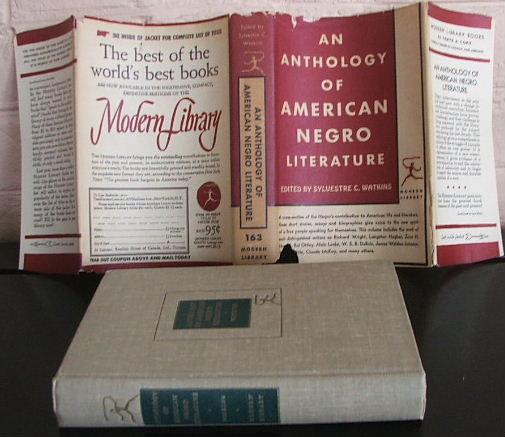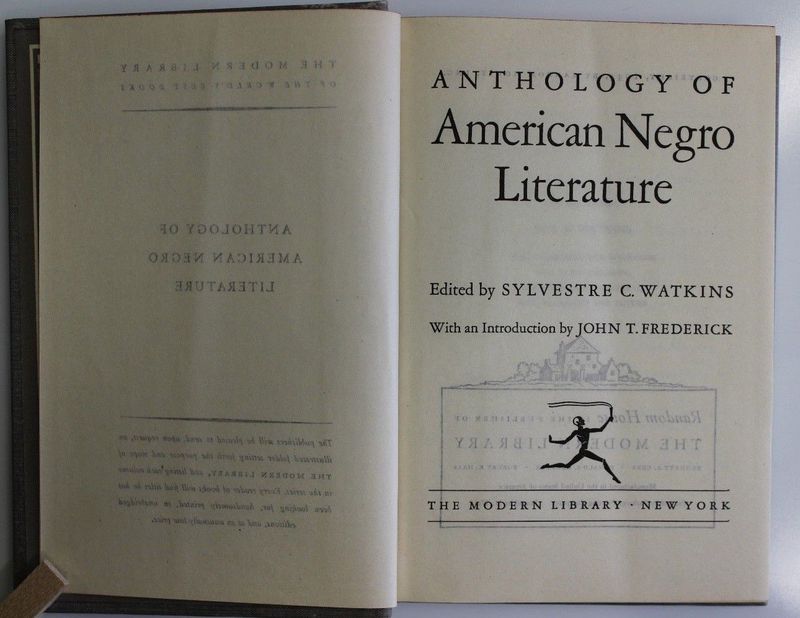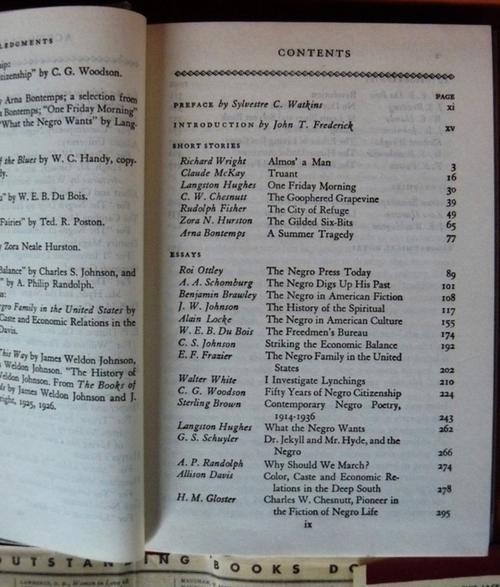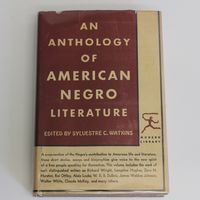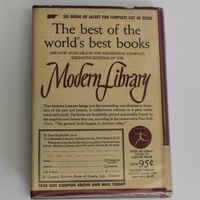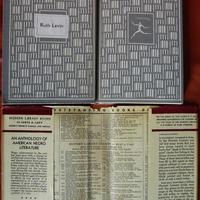-
Title
-
Anthology of American Negro Literature (ed. Watkins)
-
This edition
-
"Anthology of American Negro Literature" . Ed. Sylvester C. Watkins. Intro. John T. Frederick. New York: Modern Library, 1944. xvii+481 pp. 95 cents.
-
Table of contents
-
[Items included earlier in Calverton's 1929 edition of "Anthology of American Negro Literature" are indicated with an asterisk:]
• Sylvestre C. Watkins / Preface
• John T. Frederick / Introduction
Short Stories
• Richard Wright / Almos' a Man
• Claude McKay / Truant
• Langston Hughes / One Friday Morning
• C. W. Chesnutt / The Goopherd Grapevine*
• Rudolph Fisher / The City of Refuge
• Zora N. Hurston / The Gilded Six-Bits
• Arna Bontemps / A Summer Tragedy
Essays
• Roi Ottley / The Negro Press Today
• A. A. Schomburg / The Negro Digs Up His Past*
• Benjamin Brawley / The Negro in American Fiction*
• J. W. Johnson / The History of the Spiritual
• Alain Locke / The Negro in American Culture*
• W. E. B. Du Bois / The Freedmen's Bureau*
• C. S. Johnson / Striking the Economic Balance
• E. F. Frazier / The Negro Family in the United States
• Walter White / I Investigate Lynchings*
• C. G. Woodson / Fifty Years of Negro Citizenship*
• Sterling Brown / Contemporary Negro Poetry, 1914-1936
• Langston Hughes / What the Negro Wants
• G. S. Schuyler / Dr. Jekyll and Mr. Hyde, and the Negro
• A. P. Randolph / Why Should We March?
• Allison Davis / Color, Caste and Economic Relations in the Deep South
• H. M. Gloster / Charles W. Chesnutt, Pioneer in the Fiction of Negro Life
Autobiographies
• W. E. B. Du Bois / Revolution
• J. S. Redding / No Day of Triumph [extract]
• W. C. Handy / St. Louis Blues and Solvent Bank
• J. W. Johnson / Along This Way
• Richard Wright / The Ethics of Living Jim Crow
• W. S. Braithwaite / The House Under Arcturus [extract]
• T. R. Poston / The Revolt of the Evil Fairies
Biographies
• Arna Bontemps / Rock, Church, Rock!
• Zora Hurston / Lawrence of the River
• J. E. Washington / William de Fleurville
Biographical Notes
-
About the anthology
-
• The volume includes only prose writings (fiction and essays [and autobiographies and biographies]); no poetry or drama (Tillman 1944: 385)
• "The volume ends with three extracts from biographies and biographical notes of the authors whose works are included" (Tillman 1944: 386)
• "Watkins gives partial bibliographies at the end of the biographical sketches of the different black American writers (from early times to Richard Wright) represented in the anthology" (Rowell 1972: 48).
• There is a brief introduction by Professor John T. Frederick, who writes, "Distinctly, this is something more than an exhibit of "belles-lettres", much more than a pocket companion for a vacant hour . . . this is a literature in a dynamic sense, literature in action" (quoted in Tillman 1944: 386)
-
Reviews and notices of anthology
-
• Holmes, J. Welfred (of Winston-Salem Teachers College). "Journal of Negro History" 30.1 (1945): 85-87. "JSTOR".
""An Anthology of American Negro Literature", edited by Sylvestre C. Watkins, does not escape the general limitations of the anthology form, and in addition, shows serious faults within the special province that the editor has chosen" (85).
There is a certain lack of clarity about the scope of the anthology: in the preface, the editor says, "This collection represents the vigorous thinking and writing that characterizes today's Negro author," but the title of the anthology does not restrict itself to "contemporary" American Negro literature and the editor includes Chesnutt's "The Goopherd Grapevine" (published in 1887) along with works by "writers born since the turn of the cnetury" (85). Generically, the anthology is limited to "four types of writing: the short story, the essay, biography, and autobiography" and, chronologically, "in the main [it] includes work done in the past forty years"—but its title suggests it will cover the full span of "American Negro Literature" across "at least two centuries and a half" and across every kind of writing (85-86).
"The editor should ponder such collections as "The Negro Caravan" [ed. Sterling A. Brown, Arthur P. Davis, and Ulysses Lee, 1944], "Early Negro American Writers" [ed. Benjamin Brawley, 1935], and "Readings from Negro Authors" [ed. Otelia Cromwell, Lorenzo Dow Turner, and Eva G. Dykes, 1931] and then note the adequacy of "An Anthology of American Negro Literature" as an introduction to the entire field" (86). [It's clear, however, that this anthology does not aspire to be "an introduction to the entire field": the reviewer is right to criticize the title of the anthology as misleading, but having noted this, he also insists on berating the anthology for failing to live up to the implications of the title.]
"In spite of these limitations, this work does have definite value and usefulness. Within the narrow limits he has set for himself, the editor has chosen representative selections from the most distinguished present-day Negro writers in the four fields which make up the anthology" (86). More than a third of the writers included in the anthology were born since the turn of the twentieth century—and the works by these writers "suffer in no way through comparison with the work of the older writers. . . . This indicates a healthy condition of present and distinct promise for future writings by Negro American writers" (86).
"The theme of all the material in this collection is the 'Negro Problem.' For a long time yet this will continue to be the dominant theme for Negro American writers. While some Negro writers in the past have broken away from this all-absorbing theme, and even more are doing so now, the peculiar situation of the black American in this still partly contemptuous, partly hostile America consumes the energies of most Negro writers. However, the charge, frequently made, that such complete absorption with the 'Negro Problem' seriously limits and circumscribes the black writer and has a deleterious effect upon his thought and art, can be challenged successfully by even a superficial examination of the variety of viewpoint, the deft handling of material, the incisive thinking displayed in the contents of this work. So long as Negro writers continue to look at the 'Problem' with similar honesty, objectiveness, and artistic vigor, the body of writings by black Americans will continue to justify collections such as the present one and will merit thoughtful critical appraisals containing no vestige of contempt or disparagement" (86-87).
• Jensen, Noma, and Waldo Ivy. "Brief Mention." "Crisis" 52.1 (Jan. 1945): 26-27, at 27. [Google Books https://books.google.com/books?id=zloEAAAAMBAJ&lpg=PA27&ots=Er-rw9VTqW&dq=%22anthology%20of%20american%20negro%20literature%22%20watkins&pg=PA27#v=onepage&q&f=false ]:
"In 1929 the late V. F. Calverton brought out "An Anthology of American Negro Literature", but in the fifteen-year interval there have been seminal changes in the intellectual and literary atmosphere of America as well as in the stature of American Negro writers. Sylvestre C. Watkins includes many of these new writers in his edition of "An Anthology of American Negro Literature" (New York: The Modern Library, 1944, 95¢). Newcomers included are Richard Wright, Roi Ottley, Philip Randolph, Allison Davis, H. M. Gloster, J. Saunders Redding, W. C. Handy, J. E. Washington, and T. R. Poston. The editor contributes a preface and John T. Frederick an introduction" (27). [full notice]
• Rivers, Gertrude B. (Assistant Professor of English, Howard Univ.). Rev. of "An Anthology of American Negro Literature", ed. Sylvestre C. Watkins. "Journal of Negro Education" 14.2 (1945): 211-13. "JSTOR".
"Since the Negro has made his literature a 'purposeful thing' it is most significant that, in these days of struggle for justice for all, The Modern Library has published "An Anthology of American Negro Literature". This work exemplifies this 'purposefulness' by bringing together, in the words of the editor, 'Those selections which represent the vigorous thinking and writing // of today's Negro'" (211-12). This anthology is also significant because it is "the type of volume, because of its convenient and inexpensive form, that has the tradition of going into more than the average number of homes and libraries" (212).
"The section of short stories contains seven selections, each of which adds cubits to the reader's emotional growth and to a profound sympathy based on a new understanding of life" (212).
Regarding the section of essays: "All in all, there are essays here to meet the interests of all classes of readers, the scholar, the 'Negro-phobe,' and the average American citizen" (212).
"Although the editor states in The // Preface that the anthology would include no poetry for the reason that five outstanding anthologies have been published in this field, the omission of poetry is rather unfortunate. Poetry is one of the most purposeful types of Negro literature. Furthermore, it is expected that a good anthology should be a whole library condensed into one volume, and that it should lead from the reading of those pages we know and cherish to others which we might never have discovered on our own. Despite the omission of poetry, however, "An Anthology of American Negro Literature" as a publication of The Modern Library will go a long way toward ending the admission of inferiority and towards the beginning of the assertion of 'the unique and durable qualities of a race'" (212-13).
• Tillman, Nathaniel. "Phylon" 5.4 (1944): 385-86. "JSTOR":
"A new and welcome testimonial of the fact that Negro literature has found a permanent place in American letters is the inclusion of "An Anthology of American Negro Literature" in The Modern Library series. Now a wide range of readings in an attractive and durable binding is available at low cost to anyone who wishes to become acquainted with a representative group of meaningful writings by Negroes.
"The title, however, is a bit misleading; for ordinarily one would expect to find both prose and poetry in a literary anthology of a period or group. But only prose works are included; and the gap is not adequately filled by the two admirable essays on Negro poetry by Sterling Brown and Alain Locke. But, as the editor states, there are several anthologies of Negro poetry of comparatively recent date" (385).
"The aim of the editor was to present the more recent writings; and only occasionally does he violate his purpose—in the use of 'The Freedman's Bureau' by Du Bois, 'The Goopherd Grapevine' by Chesnutt, and 'The Negro in American Fiction' by Brawley, all appearing before 1916. But these pieces all have historical significance; and since there is a generous selection of contemporary essays, they enhance the volume" (386).
"Professor Watkins has read widely from Negro authors and, accordingly, has selected substantial and significant items. "An Anthology of American Negro Literature" is a handy book, and it should do much to disseminate knowledge of the scholarly and literary efforts of Negro writers, and to make clear the Negro's claim for dignity and standing in the American social order" (386).
-
Commentary on anthology
-
• "Replaces"--or, rather, supplements--the earlier volume with this same title in the Modern Library series (ed. Calverton, 1929), since that volume included poetry, spirituals, drama, as well as fictional and non-fictional prose.
• "The Watkins’ anthology is a routine affair, hardly distinguished from the earlier Calverton work and probably brought out in the hope of satisfying some of the overflow of a public demand created by "The Negro Caravan". This is perhaps an unfair statement, since no one would claim that the literature of the Negro is so widely known that any representative compilation does not have some contribution to make. However, the student who watches the trends in the development of a literature will recognize that with the literature of the Negro the point has been reached where compilations must perform a service beyond the mere presentation of ‘more of the same.’ The literature of the Negro requires testing and evaluation and analysis and criticism rather than repetition without end. The literature of the Negro has not yet been subjected to the kind of objective criticism, free from the demands of a racial situation, which will establish its literary claims beyond question" (John S. Lash. "The Anthologist and the Negro Author." "Phylon" 8.1 [1947]: 68-76, at 76).
-
Cited in
-
• Lash 1946: 723.
• Jahn 1965: 217 (no. 2214).
• Kinnamon 1997: 462.
-
Item Number
-
A0043


